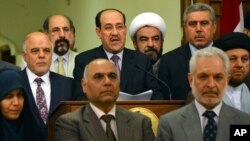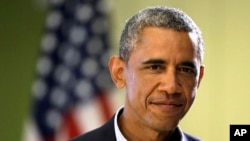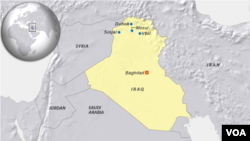Prime Minister Nouri al-Maliki has agreed to renounce power, telling the Iraqi people he will give up his post to his replacement, moderate Shi'ite Haider al-Abadi.
Appearing on state television late Thursday flanked by Abadi and other Shi'ite politicians, Maliki said he was withdrawing his candidacy in favor of Abadi in order to "ease the movement of the political process and the formation of the new government."
Maliki had faced enormous pressure at home and abroad to step aside, dropping his bid for a third term as prime minister of Iraq and ending a legal challenge to Abadi’s nomination by Iraqi President Fouad Massoum, which took place on Monday.
The White House praised the development, saying Maliki's backing of nominee Abadi marks "another major step forward in uniting the country." National Security Adviser Susan Rice noted statements of global support for Abadi, a member of Maliki’s Shi’ite Islamist Dawa party.
Maliki had been struggling for weeks to stay on as prime minister amid an attempt by opponents to push him out. They have accused him of monopolizing power and pursuing a narrowly pro-Shi'ite agenda that has alienated Iraq's Sunni and Kurdish minorities.
The Maliki resignation comes just three days after he took to the airwaves to announce he would not accept the Abadi nomination. Maliki and his backers argued that he was entitled to the nomination for a third term by law because his political bloc is the largest in parliament.
Western governments and Iran, along with Iraq's Sunni and Kurdish parliamentary factions, have for days urged Maliki to resign.
Fighting rages
Pressure mounted as Islamic State militants press their ongoing military onslaught in the northern and western parts of the country, with little opposition from outmanned Iraqi forces.
U.S. Central Command said Thursday that U.S. fighter jets and drones attacked and destroyed two heavily armed vehicles operated by militants who had been firing on Kurdish forces in the north.
Authorities said one of the two airstrikes targeted an armored truck thought to have been supplied by U.S. forces to the Iraqi military and later captured by militants.
The latest U.S. strikes are the second such action in as many days. President Barack Obama said the strikes have broken the militant group's siege on a northern mountain where members of Iraq's religious and ethnic minorities had sought refuge.
Obama said the situation on Mount Sinjar has greatly improved, and said he does not believe an additional operation will be needed to evacuate the refugees.
A team of fewer than 20 U.S. military and civilian advisers who'd inspected the area Wednesday informed the president that many of the thousands of Yazidis fleeing Sunni extremists already had left the mountain and that those who remained were in satisfactory condition.
Of an estimated 4,500 people still on Sinjar, half are herders who intend to remain, the Associated Press reported earlier Thursday, citing two U.S. officials.
The officials, who spoke on condition of anonymity, said the herders had lived on Sinjar before the siege and were not interested in evacuating.
At a news briefing Thursday, Obama said that, given the progress, "the bulk of military forces will be leaving in the coming days." He praised U.S. troops for executing airstrikes and humanitarian airdrops "almost flawlessly."
But, the president said, "the situation remains dire" in other Iraqi regions where the insurgents at times have overwhelmed Iraqi and Kurdish militia and terrorized civilians.
"We're going to be working with our international partners" to continue support for Iraqis, he said, again stressing that would be done without the use of ground combat troops.
Humanitarian crisis
Attacks by Sunni militants since June have displaced thousands of minority Iraqi Christians and Yazidis as IS expands its self-declared caliphate in parts of Iraq and Syria.
Elsewhere, in western Iraq, Sunni insurgents battled Iraqi government troops in the city of Fallujah, with at least four children and a woman killed in the fighting, the Associated Press reported.
The attack underscores the ongoing humanitarian crisis in the country, which the United Nations on Wednesday labeled at its highest level of emergency.
Thursday's fighting in Fallujah took place only 65 kilometers, or 40 miles, west of Baghdad. The city has been under the militants' control since early this year.
VOA's Victor Beattie contributed to this report, as did the Associated Press and Reuters news services.



